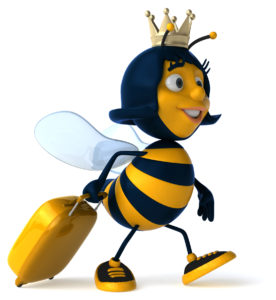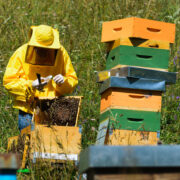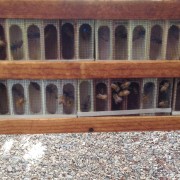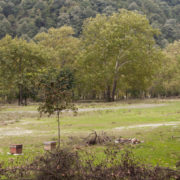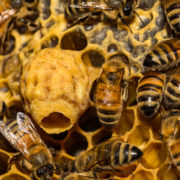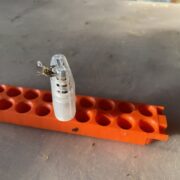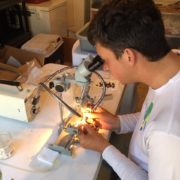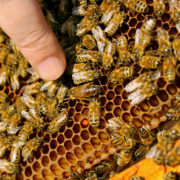From A Bee’s Perspective
We human beings love to anthropomorphize our beloved honeybees. A Google image search for “speedy” bee, “busy” bee, “happy” bee, and even “queen” bee – more often than not comes up with a human-like cartoon caricature rather than an actual insect.
While we like to think of honeybees as human-like, it can be rather difficult to wrap our heads around how very different honeybees actually are from us human beings. We appear to be alike in the way that we cohabitate our planet – mostly harmoniously and working well together in nature. However, our actual manner of living is in fact vastly different. Bees live in an insect realm of dark, vertical, and mysterious spaces. So, let’s be honest, we are not even remotely close to being the same species! Therefore, the notion that we have a similar life experience, along with a similar perspective of the world, is a vastly huge stretch.
It is easy to forget these differences, though. Here at Wildflower Meadows, we do it all the time, especially when it comes time to ship our queen bees. We lovingly prepare our weekly shipments, and wish our bees well as they travel into the very human world of trucks, highways and airports. Then, off they go, to their remote destinations to meet their new human caretakers and bee colonies. It’s as if we are sending a friend or family member off for a business trip or vacation:
- Food? Check.
- Water? Check.
- Travel companions? Check.
- Destination notified? Check.
- Flight schedule? Check.
- Check-In Time? Check.
- Okay, let’s go before we miss our flight!
Then, after all the preparations, Wildflower Meadows’ queens embark on a completely human-like journey.
But wait, the passengers are not human. They are insects!
This distinction becomes particularly obvious if a queen shipment incurs a travel delay. Just like when we humans travel across the country, unexpected delays and hold-ups do happen, whether we like it or not. UPS Next Day Air shipments of queen bees, while almost always reliable, can, on the rare occasion be delayed. At times, shipments can be disrupted by delayed flights or missed connections, or simply by the weather. Sometimes, the volume is especially heavy in the overall UPS network, thus slowing down the system’s ability to process rapidly-moving night time loads. When this happens, a queen shipment can, unfortunately, be delayed – typically by a single day. More often than not, the delayed shipment gets temporarily parked for 24-hours, usually in one of two UPS regional processing centers: Ontario, CA for the West Coast, and Louisville, KY for the remainder of the United States.
If we think of our traveling bees as human beings, this hold-up can be highly disturbing. Who among us would want to be trapped in a pitch-black box inside a mechanized industrial processing center for an entire day, with no way to leave and no way to know what is going on? If this happened to a friend or a relative, we would be terrified for their well-being and almost certainly would lose sleep worrying about their plight.
From a bees’ perspective, however, a situation like this is really no big deal. First, as insects, honeybees are used to the dark, and actually prefer it. Second, they are well-contained at room temperature with other attending bees in their shipping containers for care and company. Confined spaces actually make insects feel more comfortable and at home, not less so. The shipping packages have plenty of ventilation; and the bees themselves have more than enough food. And, they were also watered right before shipment. In short, the queens and their attendant bees are just fine! This explains why in all of our years of shipping queen bees, except in the rarest of cases, neither we nor our customers have experienced losses with bees that are delayed overnight, or for an entire day in a UPS Customer Center. Yes, it is inconvenient, annoying, and scary for us and our customers; but it’s not a problem for the bees themselves.
In fact, in exceptionally rare cases, we have seen instances where queen shipments were accidentally misrouted or redirected for days at a time, and still the queen and her attendant bees were no worse for the wear. Our famous queen, “Wheels,” comes to mind.
Of course, we all worry. But from a bee’s perspective, what’s the big deal?

